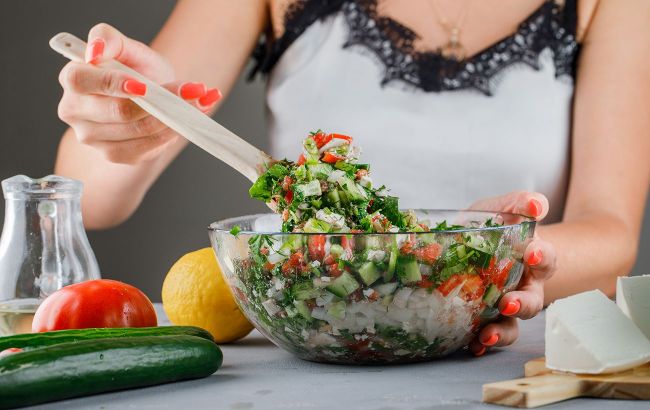Salad may have more calories than chocolate: Main mistake while losing weight
 What not to use for dressing a weight-loss salad (photo: freepik)
What not to use for dressing a weight-loss salad (photo: freepik)
Many people consider salad to be the epitome of dietary and low-calorie food. However, there is one significant nuance that can turn a dietary dish into a real calorie bomb. Ukrainian trainer Yurii Popko explains the mistake made by those who eat salads and want to lose weight.
The main mistake in salad dressing
It’s the dressing. And here you need to pay attention to what exactly you use to dress your salad and how much.
Let’s take olive oil, for example. It is considered very healthy, but from the perspective of calories, it is extremely dense. 100 ml of oil contains about 92% fat, which equals approximately 800 kilocalories. Of course, no one dresses an entire bowl of salad with 100 ml of oil, but even a few tablespoons significantly change the picture. One tablespoon of oil (about 15 ml) is already about 120 kcal.
Imagine that your salad without dressing contains only up to 200 kcal per serving, then adding 2–3 tablespoons of oil instantly increases its caloric value by 240–360 kcal. As a result, your "light" salad can easily match the caloric content of a 100-gram chocolate bar.
This often leads to surprise: "I eat little, mostly salads, but I’m not losing weight," the trainer explains.
The answer may lie precisely in the dressings. A seemingly innocent salad made of greens can make up a third of your daily calorie intake if generously dressed with oil, not to mention your other meals.
Caloric content of salad dressings
Fortunately, there are alternatives with fewer calories. Let’s compare popular dressings by caloric content per 100 g and per tablespoon:
- Olive oil: 800 kcal / 100 ml, 120 kcal / tbsp (15 ml)
- Mayonnaise (67% fat): 616 kcal / 100 g, 85 kcal / tbsp (14 g)
- Mayonnaise (30% fat): 296 kcal / 100 g, 41 kcal / tbsp
- Sour cream (15% fat): 159 kcal / 100 g, 22 kcal / tbsp
- Greek yogurt (8% fat or less): 107 kcal / 100 g, 14 kcal / tbsp
As we can see, the choice of dressing makes a huge difference.
The difference between a tablespoon of oil and a tablespoon of Greek yogurt is over 100 kcal.
Of course, it’s important to pay attention not only to the caloric content but also to the quality and composition of the products. However, ignoring the energy value means putting your health and figure at risk. Our body doesn’t care whether the excess calories come from "healthy" oil or "unhealthy" mayonnaise. Regularly exceeding your daily limit will lead to weight gain.
To control your diet, make it a habit to read product labels. The information about caloric content and ingredients is there for a reason — it’s for you.
By understanding the energy value of dressings and other products, you can make your "light" salad truly diet-friendly simply by choosing a lower-calorie option or reducing the amount of dressing, and achieve your goals for weight and health.
You may be interested in:
- This delicious dessert you can eat every day
- Here’s why the belly grows with age
- How much you should weigh according to your height, and what exceptions exist
This material is for informational purposes only and should not be used for medical diagnosis or self-treatment. Our goal is to provide readers with accurate information about symptoms, causes, and methods of detecting diseases. RBС-Ukraine is not responsible for any diagnoses that readers may make based on materials from the resource. We do not recommend self-treatment and advise consulting a doctor in case of any health concerns.

